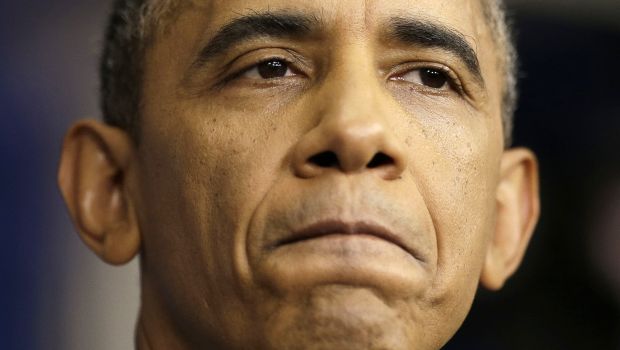
In this October 8, 2013, photo, President Barack Obama pauses as he talks about the the budget and the partial government shutdown in the Brady Press Room of the White House in Washington. (AP Photo/Pablo Martinez Monsivais)
It’s not just Republicans taking a hit in a new AP-GfK Poll, which showed that approval ratings for Obama and Democrats were also plummeting as the partial shutdown reached its ninth day and next week’s deadline approached for increasing the US debt limit.
The US government has been partially shut since October 1 because of Congress’ failure to pass a normally routine temporary spending bill. Obama also wants Congress to extend the government’s borrowing authority—another once-routine matter—warning that if it fails to do so by October 17, the United States will not be able to pay its bills.
Republicans were demanding talks on deficit reduction and Obama’s 2010 health care overhaul law as the price for boosting the government’s borrowing authority and returning civil servants to work. Obama wants Congress to first end the shutdown and extend the debt limit.
Amid the tough talk, though, were indications that both sides might be open to a short-term extension of the borrowing limit and a temporary end to the shutdown, giving them more time to resolve their disputes.
Obama used a White House news conference to say he “absolutely” would negotiate with Republicans on “every item in the budget” if Congress first sent him short-term measures halting the shutdown and the extending the debt limit.
“There’s a crack there,” Boehner, the Republican speaker of the House of Representatives, said of the clash late Tuesday, though he cautioned against optimism.
Obama invited House Democrats to the White House for a private meeting scheduled for 4:30 pm Wednesday. The White House said that the president intends to invite Republicans and senators in the coming days.
Boehner’s Republicans may end up taking the biggest hit in public opinion for Washington’s gridlock, just as that party did when much of the government closed 17 years ago during President Bill Clinton’s administration, according to the Associated Press-GfK survey, released Wednesday.
Overall, 62 percent mainly blamed Republicans for the shutdown. About half said Obama or the Democrats in Congress bear much responsibility.
The AP-GfK Poll was conducted October 3-7 and involved online interviews with 1,227 adults. The survey has a margin of sampling error of plus or minus 3.4 percentage points for all respondents.
Obama’s approval rating fell to 37 percent. Democrat Harry Reid, the Senate majority leader and Boehner, both had a favorability rating of just 18 percent.
The financial world voiced its disapproval, flashing unmistakable signs that it feared Washington’s twin battles could hurt the economy.
The US stock market declined again Tuesday, with the Dow Jones industrial average dropping nearly 160 points, or 1.1 percent. The International Monetary Fund trimmed its global and US growth forecasts through 2014, warning that failure to renew the debt limit would raise interest rates and potentially shove the American economy back into recession.
The Obama administration has said that unless Congress acts, it expects to have an estimated USD 30 billion in cash left by October 17. That is pocket change for a government that can spend tens of billions more than that on busy days and USD 3.6 trillion a year.
Hitting that date without congressional action would risk an unprecedented federal default that would wound the economy and deal lasting harm to the government’s ability to borrow money, many economists warn.
Some Republicans have downplayed the significance of the deadline, saying that even then, the United States would be able to pay China and other holders of US debt. But Obama said they were badly misguided, warning that default would harm the economy, cause retirement accounts to shrivel and houses to lose value.
Other Republicans have made it clear in recent days they agree with the threat posed by default and are determined to prevent it.
On Tuesday, Senate Democrats introduced legislation that would avoid those scenarios by letting the government borrow money through December 31, 2014. It contained no spending cuts or other deficit-cutting steps many Republicans seek.
The bill’s fate was uncertain, since the 54 votes Democrats can usually muster are short of the 60 votes they would need to overcome procedural maneuvers aimed at derailing the bill. An initial test vote seemed likely by Saturday.
Tuesday’s economic tremors did little to alter each side’s demands.
Republicans were continuing their tactic of pushing narrowly targeted bills through the House—over Democratic objections—that would restart popular parts of the government.
On Wednesday, they planned votes on a measure financing death benefits to families of fallen US troops. Blaming the shutdown, the Pentagon has halted the USD 100,000 payments, usually made within three days of a death, a stoppage Boehner called “disgraceful.”
The shutdown began more than a week ago after Obama and Senate Democrats rejected Republican demands to defund “Obamacare,” then to delay it, and finally to force a one-year delay in the requirement for individuals to purchase health care coverage or face a financial penalty.
It was not a course Boehner and the leadership had recommended—preferring a less confrontational approach and hoping to defer a showdown for the debt limit. Their hand was forced by a strategy advanced by Texas Senator Ted Cruz and conservative tea party-aligned House members determined to eradicate the health care law before it fully took root.
